
Interview with Cesar, a veteran of the Spanish Civil War and a volunteer in the Spanish Blue Division on the Eastern Front. At the time of this interview he was visiting Columbus, Ohio, to see his son, 1986.
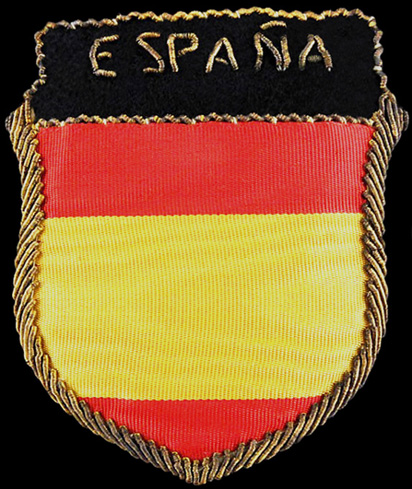



Interview with Cesar, a veteran of the Spanish Civil War and a volunteer in the Spanish Blue Division on the Eastern Front. At the time of this interview he was visiting Columbus, Ohio, to see his son, 1986.


Cesar: Yes, you can, my son says you are a history buff like myself. First and foremost you have to know a little bit about Spain and the start up to the fighting. I blame it all on the communists who for decades prior had been gaining strength in Spain. The conditions became bad for those who were Catholic and anti-communist, the communists started stripping away rights and property. They did it through referendums and dictates they claimed were to help the poor and working class. They forced the church to turn over land and property which they then sold and turned into barns or meeting centers. The people started to migrate away from the hot beds of red control; my parents had to leave the area of Madrid and settled in a city called Salamanca [a city in western Spain] where they were safe. I was 18 at the time and worked on a farm. There were calls by the communists to stop working for land owners and farmers. They wanted to try to bring down the state so they could take full control.
I was not buying what they were saying. They accused the rich and the land owners of cruelty and abuse of workers. My father and mother both had worked in Madrid, my father was a brick layer and my mother was a dishwasher. Our family was and still is very Catholic, and due to this they were ridiculed and taunted. Madrid was a red city and if you didn't follow them you were targeted, tens of thousands fled the cities before the war as they could see what the future held. We would hear survivors speak of church servants being executed, churches firebombed, and any nationalist who was vocal was attacked, many being killed. Due to this conduct, those who opposed the reds rose up in a coup, with General Franco taking control. I remember when this all happened. The government was in the hands of communists who conveniently called themselves republicans. They tried to hide behind the mask of being democratic and fair. They were anything but that.
The fighting started by them openly attacking nationalist areas where people fled to seek refuge. They began forcing the people to pay taxes and submit to their authority, refusing meant death. Doing these things pushed people into picking sides, and as the military started to revolt, open fighting began. I was 18 and read a poster calling all able-bodied men to join France to save Spain. I did this without regret. I had to go to training and since I had followed what my father did, I was good at building things. I was part of a civil guard unit and I was also part of the building troops. I would help build fortifications and bridges. For me the fighting started in 1936 when Franco called for the nation to rise up to save itself. I knew the reds were wrong; they hated the country and its deep history. They wanted to replace our culture with what they called modern thought. We could not bear to see that as it meant an end to Christian morals and duty. So that is why I became involved, when it was over and the Second World War happened I wanted to still fight the communists so I volunteered to fight in the east.
[Above: In one of the most gruesome, disturbing and horrific actions to come out of the bloodsoaked 20th century, here are two pictures of communists in Spain during the civil war. The picture on the top shows communists who have taken the corpses of nuns from a Catholic monastery in Barcelona to defile and pose with the bodies! The bottom shows the same done elsewhere. In fact, this inhuman practice happened all over Spain, wherever the communists controlled or passed through. Like in Russia after the communist 'revolution', they even turned churches into stables for animals to defile them. Truly unbelievable stuff. Click on the image to enlarge and see more pictures showing the stark evil of communism.]
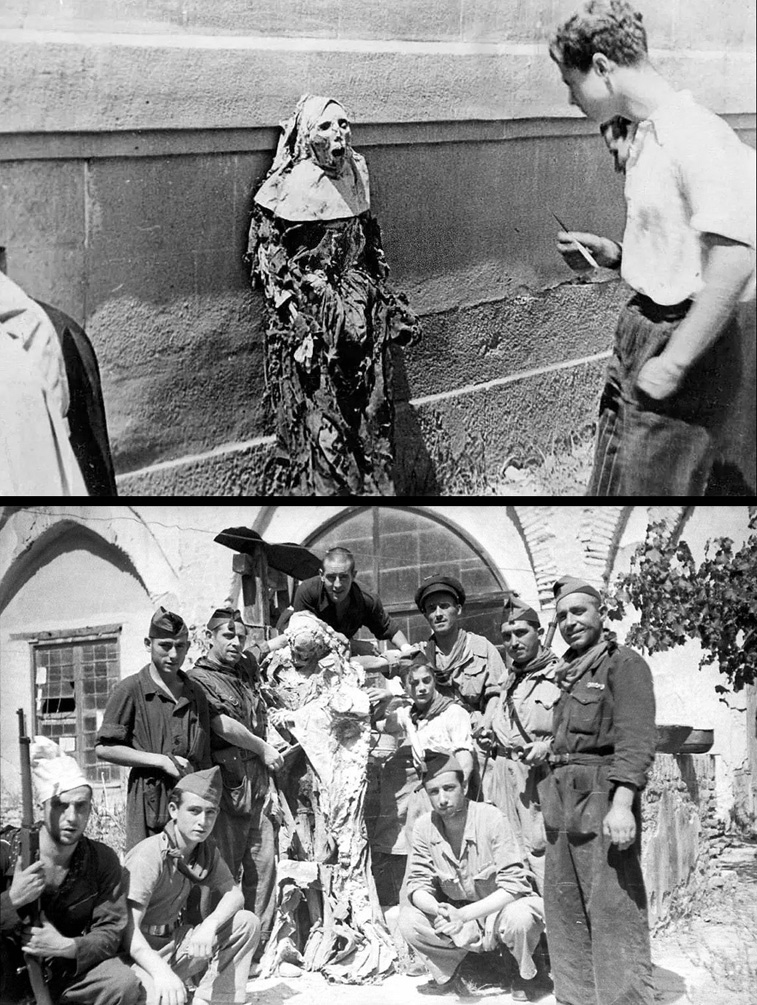
Can I ask about the fighting in the civil war? I have read that it was bad and here they say the forces under Franco committed many atrocities against the people.
Cesar: Well, my friend, you must understand something about this modern world. You see the people who write your history all have gotten their information from the same source. So if that source is wrong, then their information is wrong. I see historians today as being lazy, or indoctrinated. Reference books have quoted each other and created a fact without investigation.
Since the source of their information is many times put out by those who oppose our side, then when someone repeats what they say and call it historical fact, they are wrong. I was a soldier and saw much fighting during this time, it was fierce and full of retributions.
We would capture areas held by the reds and immediately people would come to us and ask for help. They would tell of mass executions by the reds of their family and friends. We came across many scenes like this, the reds would rule by force and terror. Many reds came to Spain from all over, especially Russia.
I can tell you the foreign ones were crueler because they did not understand Spaniards, they fought only for the world revolution. They would kill without mercy anyone who openly opposed their beliefs. What makes me puzzled is how people could fall for such hypocrisy. The reds said they had to take away freedom and rights because they wanted to protect the people from those who took away freedom and rights.
The war on the Church was something I also could not understand. My unit came across many towns where they burned the churches and we would see the graves of priests and nuns. When asked what happened, it was all the same. They killed them because they had no use for Christians. They claimed they were a fifth column sent by Franco.
You can still read the truth in Spain today, but the country is starting to revert back to the communists. The UN made calls for all parties to be represented, but all this does is pave the way for the buying of votes and corruption. This is how it all started, back many decades ago.
When they say Franco's forces committed atrocities, they are not being honest with you. You see, when these reds were caught, especially the foreign ones who committed killings and brutality, they in turn were punished by the rope or a firing squad. I saw with my own eyes the way they waged the war, and they deserved any punishment they got.
What about the city Guernica which the Germans bombed. I understand they killed a large amount of civilians for no reason.
Cesar: No, this is a misunderstanding. That town was a hub of the reds and the bombing was done by our men who worked closely with the Italians and Germans. They sent us much help to counter what Russia and the others were sending. By hitting that city they destroyed key communications.
It took away a start off point for the reds, for an attack they were going to make. Because this was disrupted Franco was able to attack and seize the whole northern areas. It was a master stroke of luck. It dealt the reds a blow they never recovered from.
That painter, Picasso, was a member of the reds and became famous due to communist sympathizers around the world. Many of them are in high places and have always been. He was made famous because he was one of them. We have many artists of ours who paint much better.
Speaking of which you know art is a reflection of the artist's soul. It is a window into their mind. I went to that German museum in Munich and can tell you those Germans under Hitler had good souls. I don't care what anyone thinks of that. There was something special there. You see it all over our world, those who have no souls or an evil soul, show it in their works.
The enemies of God promote these soulless, untalented creatures. They inflate their art and have created a false sense of order, where in reality it is disorder and signs of mental illness. So do not easily believe what they say about what happened in Spain.
[Above: Franco's nationalist troops during the Spanish Civil War.]
[Above: Nationalist poster 'Espaņa - una - grande - libre' (Spain - United - Great - Free).]
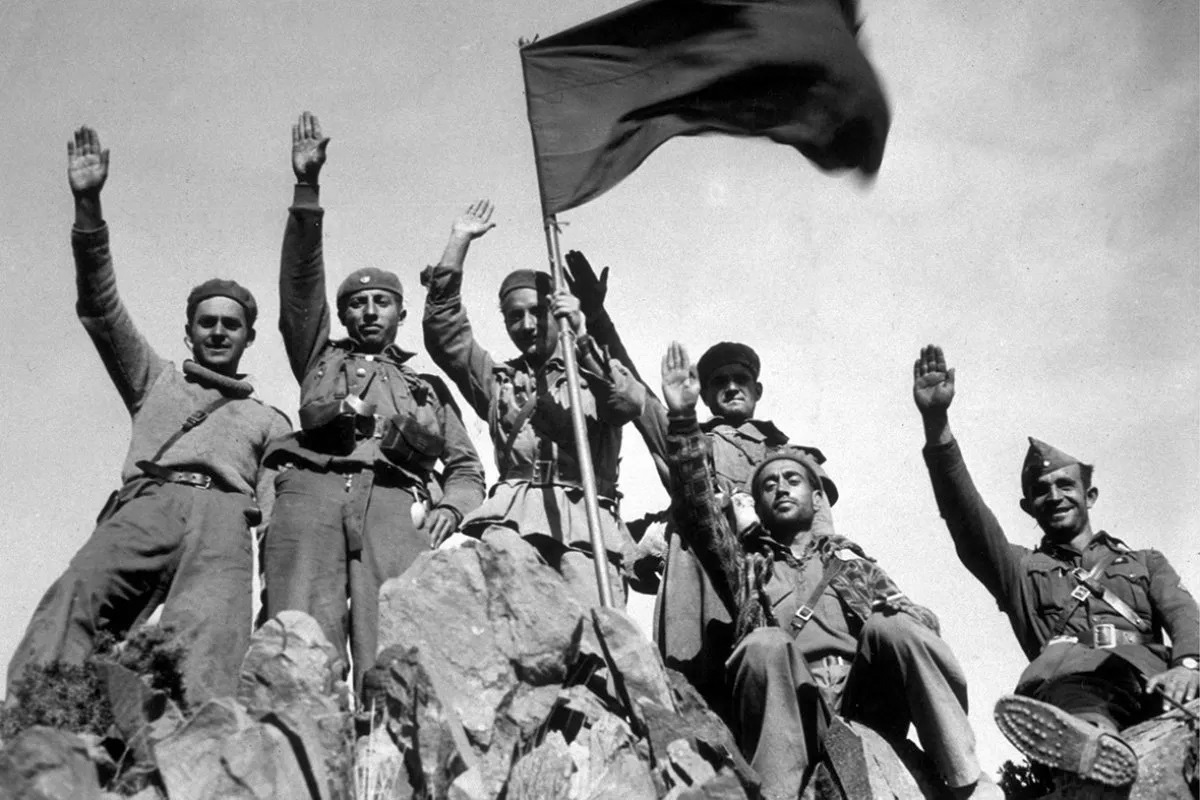
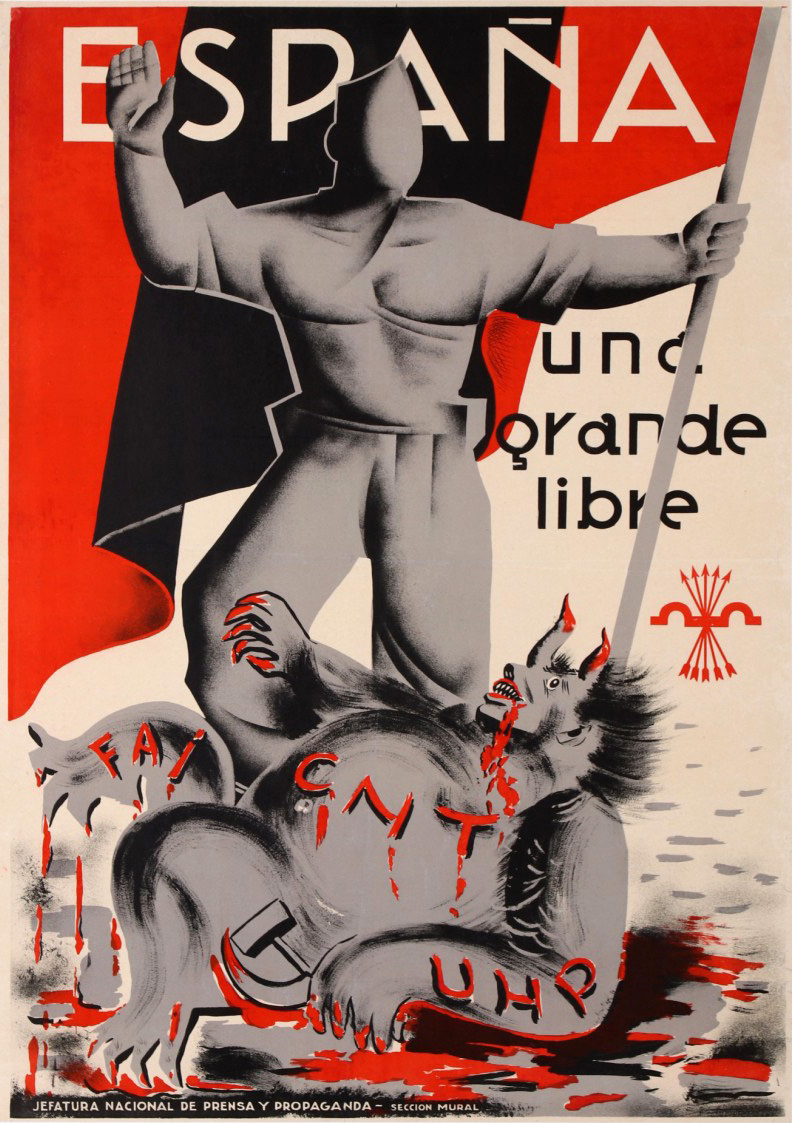
Can I ask about how you came to fight for Germany?
Cesar: Sure you can. After our war was over in 1939, that is when Franco marched into Madrid and claimed victory. I settled down with my family to restart our lives that the war interrupted. I even met a young girl who was new to our block. She came with her mother to our town after her father was murdered by the reds.
We started to write when I was away in Germany in 1940 learning tradesmen skills in advanced bricklaying. The Germans were very good to me and I felt close to them as fellow peoples. I came back home and settled into a job as a builder, as many towns in Spain had been badly damaged by the fighting. I was gone a lot from town to town, always taking pride in my work. I have shown my son buildings I helped rebuild that still stand today.
In 1941 Germany went to war with Stalin's Russia and a call went out by Franco to help aid in this fight against our old enemy. I told my parents of my decision to go join up and I was blessed by our priest. I went to Madrid to volunteer and after a few days of waiting we were put on trains and sent to Germany.
We were welcomed as friends of the Germans and treated like royalty. The youth came to give us things to read, treats, and cards. I remember the young girls came to sing for us at our barracks. This feeling of euphoria did not last long.
We started right into training and our training NCOs warned us that we were fighting a colossus and only paying attention and learning skills will keep us alive. We were treated just like the soldiers in the German army and we received the exact same training. We had Portuguese men with us as well that came to help fight Stalin.
Our training lasted weeks and then we were sent on a leave after our general gave us a speech to congratulate us on completing our training. We felt ready to go. We were afraid the war would pass us by, as the Germans reported success after success. Can you imagine us men thinking we would miss out on the war? Little did we know how it would end
You know even Hitler saw us off; there were many generals and government people there. It felt as if we were embarking on a great holy crusade, which we did call the crusade against communism.
What was it like for you in the east? How did you view the Russians?
Cesar: We went in the fall of 1941 to the east. What we saw then was a vast land that had been conquered. The people were friendly. When were arrived they came to offer food and all sorts of wares. I was prepared to see a land and people in chaos, but the Germans had good order.
When we got off the train the first thing I saw was a food stand where Russian women were selling stews and fruits. I saw children playing in the town square and German soldiers speaking with civilians. It was bright and sunny and I thought to myself I would like this, it reminded me of back home.
The Germans did not put us in the front right away, we stayed in the back areas and helped the civilians with the harvest or rebuilding. They told of Russian soldiers setting fire to towns and destroying farms. They tried to deny food and shelter to the Germans. They did the same in our country, we would try to tell the people.
I would say we liked the Russian people. You must understand the war was against the reds and Stalin, not the people. The people were treated very well, as far as I could see, and I saw nothing that makes me believe any of what the Soviets have said after the war. I think they are lying about the treatment of their civilians by the Germans.
My time in Russia did not last long, you see, I was wounded in my first action. We were ordered to march to the front as there was a shortage of trucks. We passed through village after village and the people came to watch, and give us what little they could offer. The harvest had been bad due to the war and also due to the red army seizing food and animals.
We came to the Leningrad front around Lake Illmen [a large lake in the Novgorod Oblast of Russia] where we settled into positions. It was now getting cold and we had issues with not having enough winter supplies. Calls went out for back home to start sending warm weather goods like gloves and socks. The Germans were even affected by this.
We had started to join attacks against Soviet positions and were fighting a position war around the river. We needed bridges and I was helping to build and secure places to cross. One day while helping with this, a Soviet unit showed up on the other bank quite unexpectedly and opened fire. I could see them clearly and went for my rifle to shoot back.
I made it maybe two meters when I felt a stinging pain in my leg and side. I had been shot and was knocked out. I was later told it was a Russian patrol that stumbled on our party. I was removed after they were driven off, but lost a lot of blood. I was taken to an aid station.
The doctors made me a critical casualty and had me evacuated to a larger hospital. I remember this, being on a hospital train traveling back into Poland. I was in a German military hospital where volunteers from Spain had been sent. A good Spanish doctor looked me over and told me I was lucky.
I was shot in my side where the bullet hit my lung and in the thigh. I had lost a lot of blood and it took weeks for me to recover. In the meantime the Russians had launched a large scale attack with fresh troops from the east. They drove us back and caused severe losses. The Spanish division was hit hard, with many losses.
I was made unfit for service as the wound in my leg made marching too hard. I was told my fighting was done. I was given pay, food parcels, and get well cards from the youth groups in Poland. My time there was very good, but I was sent back to Germany, discharged and sent home.
You could say I was lucky in many ways, as many men I met during that summer of '41 never came home. I never saw them again. They fell in battle or were captured and killed. I have learned that many of the division that surrendered were mistreated badly and only a small portion ever saw Spain again.
So I count myself as lucky, and I did my duty to the oath I swore.
[Speaking to his son] My wounding was announced back home when it happened and your mother was so worried for me she came all the way to Poland to see me, son. So in this regard it was a good thing as it made me realize life was too short to not have a family. It was here that I proposed and when I made it back home we were married.
I wore my uniform and it was a big event as I was one of the first of the volunteers to come home. I was met with reporters and well wishers. I settled down into a good life and had my son in 1943.
[Above: The brave and fearsome men of the Spanish Blue Division. Consider that many of these men were veterans of the brutal Spanish Civil War, which decimated most of Spain from 1936-1939. It didn't take long before the Russians learned to fear them. There are even reports that Russian commanders on the battlefield would purposely keep it from their men when they were about to face the Blue Division, such was their reputation for ferocity.]
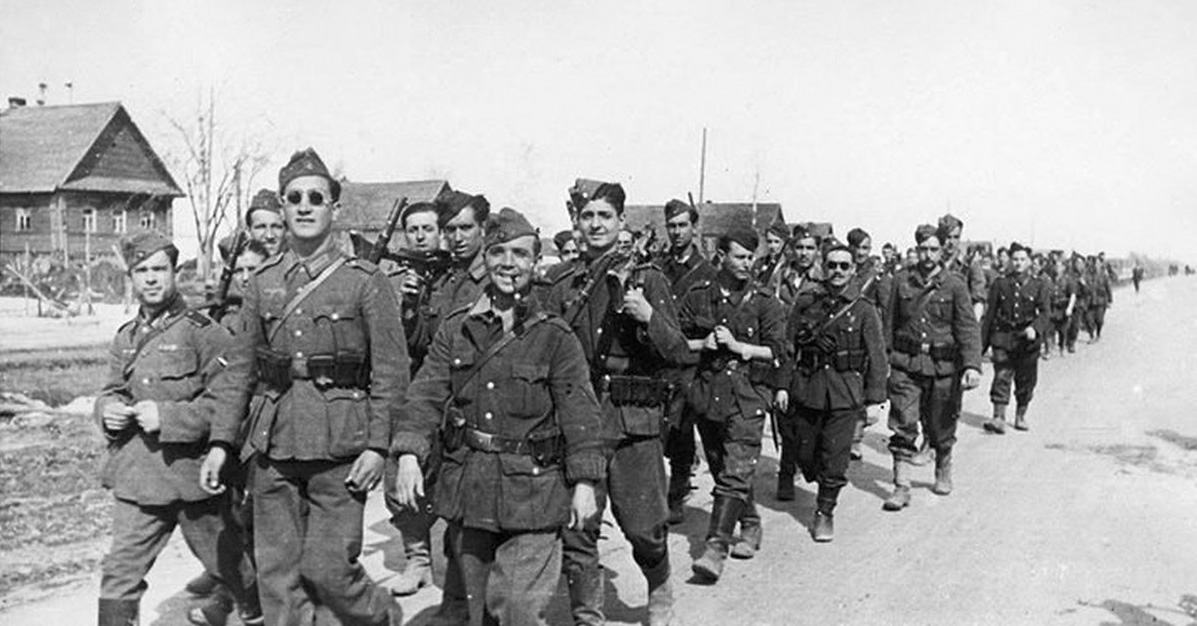
I have read that the Germans committed a lot of war crimes in the east, especially the SS. Did you see any evidence of this happening?
Cesar: I can not tell you that I did, I was only there for a short period, however. I know the Germans had problems with stragglers and some formed militia groups to keep fighting. We were warned to watch out for bandits, as they were called. I never saw any of them and did not have any engagements with them. The war we saw was not really a war until we got to the front. All of the people we encountered seemed to be very relaxed and at peace. The Germans seemed very relaxed behind the front as well.
We would often joke that if this was the war then we would love to see the peace. I know there were warnings put up regarding sabotage or attacking soldiers under military orders. We had heard through rumors that some civilians had been hung for crimes but I never saw any of this.
They show plenty of pictures today but I wonder how many are actually victims of the reds, who are labeled as victims of the Germans. You have to watch these things. A trick the Russians did, as I understood it later on, was use German uniforms to stage photos to prove a crime.
The French claim these types of stories as well, and I can tell you a large number of reds fled Spain in 1939 and France willingly let them settle in the south. Later on, in the war, they made trouble for the Germans in the south and when they were punished they cried out that they were victims.
I saw all their crimes here, so if the Germans said they were committing crimes in France, then I believe the Germans. I would say if the Germans did anything to them it was justified retribution.
[Above: A Spanish Blue Division soldier tacks a 'Espaņa' uniform patch to the grave marker of his comrade. What's most remarkable about the Spanish volunteers is their deep loyality and immense bravery. When Germany and her European allies attacked the Soviet Union, the Spaniards could not just sit back and do nothing. They refused to let their German comrades, who had helped them defend Spain from a communist takeover, go into danger without them. But even more so, when the war started to go bad for Germany and the Allies put pressure on Franco to remove the Spanish volunteers, thousands of them refused to leave their German comrades, even if it meant disobeying Franco. Many of them were flown back to Spain and, incredibly, walked to France, snuck over the border, and made their way to Germany to join their comrades once again. Truly, the Spanish spirit and their iron mettle never shined so bright.]
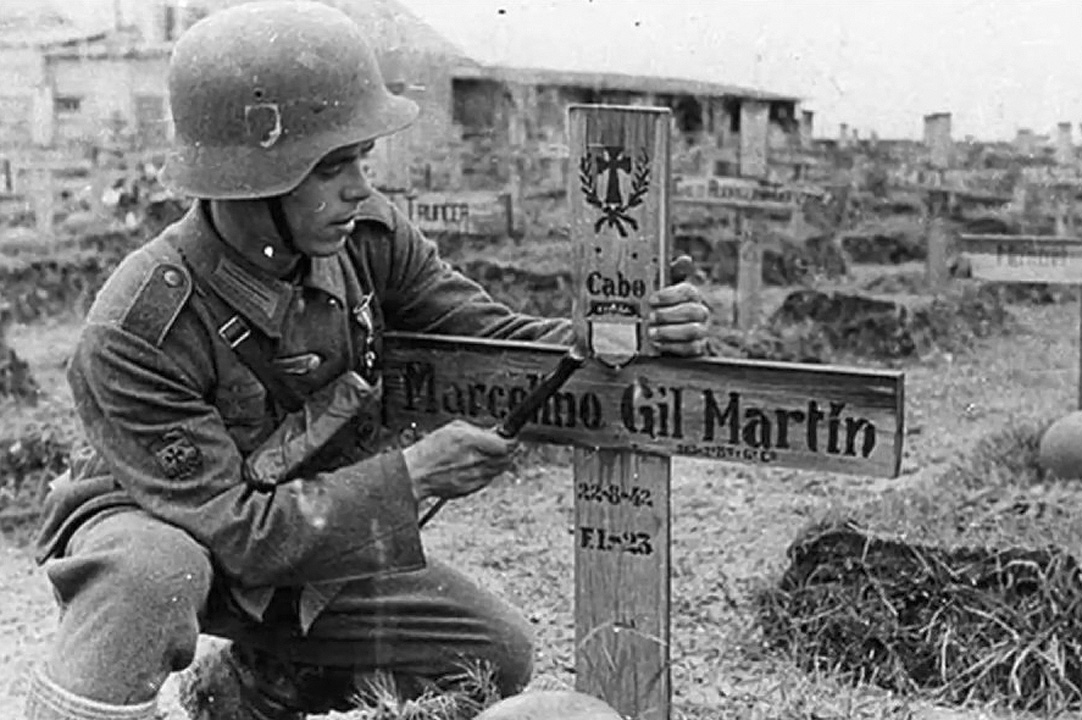
Back to Interviews